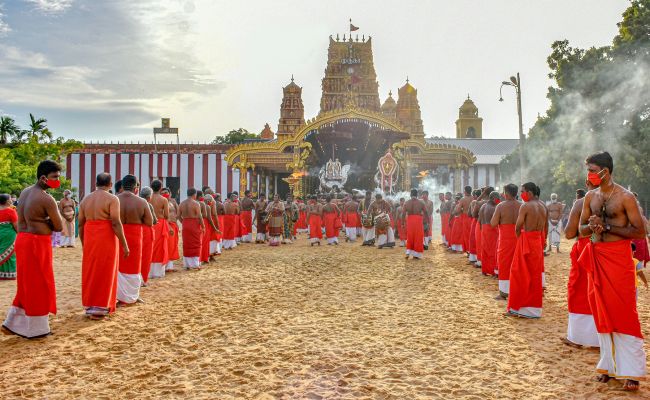The Mahotsavam, also known as the Nallur Festival, is the biggest and most revered, with processions and spectacular festivals. Sri Lanka Nallur Festival is held in Nallur Kandaswamy temple, Jaffna, Sri Lanka. It honors Lord Murugan, Goddesses Valli, and Deivanai. The Sri Lanka Nallur Festival is held in Jaffna for 25 days in July, August, or September, depending on the Tamil calendar, after the ‘Aadi Amavasai’ day.
Nallur Kandaswamy Temple History
The temple holds the Kodiyetram, an annual event that starts with the raising of the Holy flag. For generations, the fabric for hoisting has been ceremonially transported to the temple in a tiny chariot by members of the Sengunthar Kaikola Mudaliyar dynasty. Nallur Festival lasts twenty-five days and includes Yāgams, Abishekams, and special poojas.
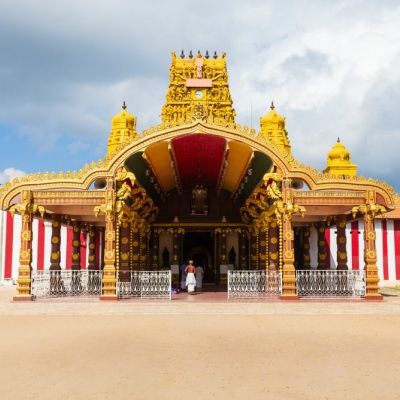
Kovil (temple), which dates back to Aryachakravarthi’s reign in the 13th century, has a rich history. Since its resurgence under Dutch occupation, the Nallur Kandaswamy temple has thrived under the Maapaana Mudaliyar family’s custodianship, where Shaivism customs and devotion to the Divine Child – Lord Murugan are faithfully adhered to. The basic brick building created for the ‘Vel’ in the early days still stands as the Sanctum Sanctorum, surrounded by Dravidian and Hindu architectural features added throughout the ages. All worshipers are treated equally, and it is the only Kovil in Sri Lanka where archanai (personal pooja) is provided for one rupee. Over the years, the Custodians have ensured that time is respected as holy and that all ceremonies, pooja, and even festivities go place on time.
Nallur Festival: A 25 Days Festival
Vairavar Utchavam
Saivism in Sri Lanka combines an old religion known as Nattar Vazhipadu (pronounced naat-taar va-li-pa-doo) and Agama traditions with Vedic ideals and practices. Lord Vairavar is an old divinity from Nattar Vazhipadu. Following ancient rituals, Lord Vairavar is summoned to defend the 27-day Mahotsavam celebration. His authorization is required to start the celebrations. On this day, around dark, Lord Vairavar travels in a black dog-shaped chariot accompanied by flags and emblems.
Kodiyetram ( Flag hoisting festival)
The Kodiyetram, or flag-hoisting festival), marks the start of the 27-day Mahotsavam. Thus, it is the first day of celebrations. Every year, heirs of the Sengunthar Mudaliyar family donate the finely made white flag fabric. This weaving family has carried up this practice for decades. The fabric is transported by chariot from the weavers’ home to the temple and then hoisted. Devotees sing Arohara Arohara and decorate the flag with flowers. It’s a beautiful and emotional sight.
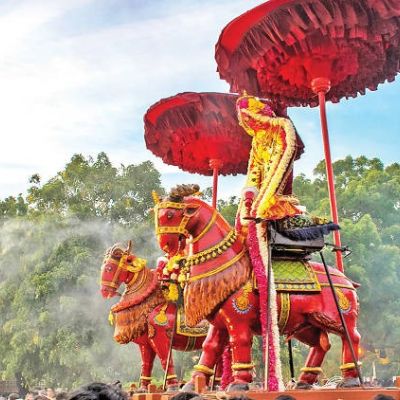
Lord Murugan, also known as Katharagama Deviyo (the God of Kataragama), is transported on a silver peacock chariot with his weapon, the Vel spear. He is joined by his two wives and his brother Pillaiyar or Gana Deviyo, who rides a silver rat chariot. Auspicious Red will be used in all decorations, including priests’ and officials’ clothes. For the next ten days, there will be a succession of religious services followed by parades.
Manjam (Macham Festival)
This is the 10th day of the festival in this series. During this nighttime ceremony, Lord Murugan’s statue in his Muththukumaraswamy form is taken out of the temple to bypass the Nallur temple with his wives. The Tamil word manjam means bed. So the manjam chariot moves slowly. Devotees, males to the left, and ladies to the right walk beside the gorgeous chariot. The Chariot features images from the Puranam legends and is beautifully lighted. The chariot is hefty and huge. Worshipers must drag it rather than carry it on their shoulders. The priest and authorities will be dressed in yellow.
Arunagirinathar Utchavam (Arunakirinathar Festival)
This is the 17th day of the festival and takes place late in the evening. Arunagirinathar was a Tamil Saiva poet who wrote a collection of poetry titled Thiruppugazh, or ‘Holy Praise’ to Lord Murugan. A dramatization of Arunagirinathar’s life narrative in which he changes into a parrot is shown. The authorities and clergymen will wear parrot green.
Karththigai Uthchavam (Karthigai Festival)
On the evening of the 18th day, Lord Murugan will ride in a big chariot. The chariot is separated into three sections. Lord Murugan occupies the central compartment, with his two wives in the compartments on each side of him. Lord Murugan’s wives, Valli (left) and Theivanai (right), will follow him as he circumvents the Temple. The hue blue will be prominent in the decorations and clothes.
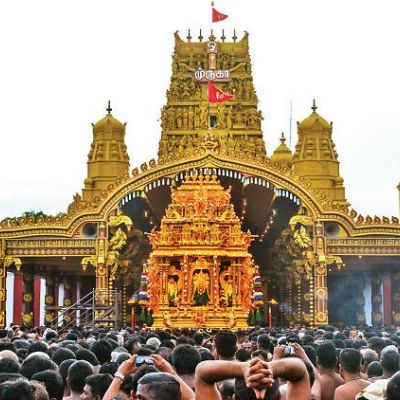
Soorya Utchavam (Sooriyatsavam Festival )
This is the 19th day of morning festivity. This event honors the Sun deity. This is the only temple in Sri Lanka with a festival honoring the Sun deity. During this event, the Sun deity rides a chariot drawn by seven horses. His two wives, Chaya, the Goddess of Shadow, and Maya, join him as he circumvents the temple.
Santhanagopalar Utchavam (Santhanagopalar Festival)
On the morning of the 20th day, a feast for Santhanagobalar is celebrated. Santhanagobalar is the name given to Lord Vishnu’s newborn avatar or incarnation. The fun statue of Baby Krishna nibbling his toes is perched atop a five-headed cobra chariot. Sky blue will be used in both the decorating and clothes.
Kailasa Vahanam / Kailasa Vimanam
This celebration is celebrated on the evening of the 20th day of festivities. This day saw the employment of a particularly beautiful chariot. Mount Kailasa is part of the Himalayan mountain range. This mountain is said to be the home of Lord Murugan’s father, Lord Shiva, and his family. King Ravanan, an ancient Sri Lankan king, is said to be a devotee of Lord Shiva who sought to raise Mount Kailasa and fly it to Sri Lanka. The chariot known as Kailasa vahanam/vimanam shows a scenario from the epic Ramayanam. Lord Murugan, in his symbolic Vel form, is transported in this chariot beside his two brides.
Kajavalli Mahavalli (Kajavalli Mahavalli Festival )
This is the morning festivity on the 21st day. During this occasion, Goddess Durga, also known as Mahakali, is honored. Goddess Durga is transported about the Temple in a chariot drawn by a roaring lion or the mythological monster Yaali. The Yaali is a mix of elephant and lion.
Vel Vimanam, or Thanga Ratham Festival
This celebration is held on the evening of the 21st day of festivities. On this day, Lord Murugan rides in a golden chariot drawn by golden horses. Devotees from all across the island come to attend this celebration. Almost all of the decorations are pink.
Thandayuthapani Utchavam Festival
This happens on the 22nd morning. The celebration is also known as Mampazha Thiruvizha (pronounced Mam-pa-la thi-ru-vi-laa). It is a dramatization of a Purana narrative that emphasizes the significance of parents to children. Lord Murugan is joined by his older brother Lord Pillaiyar, who triumphs in a race to win a mango and circumnavigate the temple. An enraged and defeated Lord Murugan escapes to the Palani mountaintop, clothed in a loincloth and wielding a mace or Thandayutham.
Orumuga Thiruviza Festival
This amazing celebration takes place on the 22nd evening. This is also known as Vettai Thiruvizha. Vetti translates to “hunt.” So this celebration depicts Lord Murugan embarking on a hunt. This day features a procession of dancers, musicians, and soldiers. Priests also carry swords instead of the traditional puja materials. The spectacular proclamation before Lord Murugan leaves the Temple building to hunt is a magnificent event to see. Lord Murugan travels in a horse chariot.
Sapparam Festival
On the 23rd day evening, Lord Murugan rides a chariot called Sapparam around the Temple. Pulling this enormous and lofty chariot demands a large number of enthusiasts. Any visitor to the temple on this day will be blown away by the festival’s decorations and grandeur.
Ther ( Chariot Festival )
This is the day for the Grand Chariot Festival. It happens on the morning of the 24th day. The event attracts significant attendance from all around the globe. People flock to meet Lord Murugan in his majestic chariot known as Ther, believing that he will see them. As a result, all evil and suffering will be removed from their life. The temple will be surrounded by a statue of Lord Murugan with six heads and twelve arms, all decked in the best jewelry and fabric. On this day, a variety of kavadi, or religious body piercings may be observed. The arduous actions that women and men engage in on this day demonstrate the intensity of the people’s devotion and affection for Lord Murugan.
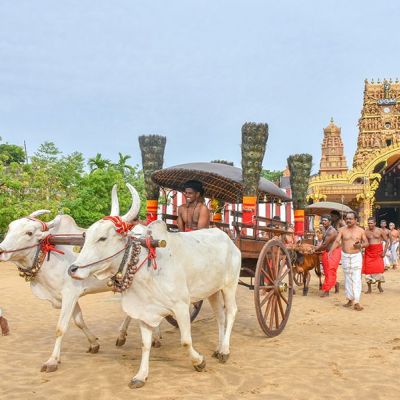
Lord Murugan arrives at his residence clad in green, dancing on the shoulders of his followers. This is supposed to soothe the God who has defeated evil.
Theartham Festival
This occurs on the morning of the 25th day. This is the Holy Bath Festival. This event takes place within a ceremonial tank inside the Temple compound. On this day, Lord Murugan takes a ceremonial bath in this tank. It is only fitting after Lord Murugan’s march the day before, in which he destroyed evil and cast his gaze over the Jaffna Peninsula. Young and old alike excitedly await to be showered by the waters used to wash Lord Murugan.
Flag Lowering Festival
On this 25th-day evening celebration, the flag that was raised 25 days ago is lowered. All decorations will be white. Often, believers choose to dress in white. The flag is lowered amid acclaim from the devotion. The Head Priest of the Temple then hands over the flag to the Sengunthar Mudaliyar family, who are weavers.
Poongavanam Festival
Lord Murugan’s marriage to Valli takes place on the evening of the 26th. It is a dramatization of Lord Murugan’s marriage to Valli, his second wife, and himself. When Lord Murugan’s first wife, Theivanai, learns about the marriage, she locks the couple out of the Temple shrine. A fascinating sequence of events unfolds, with the request for forgiveness and understanding. Both sides engage in song-based dialogue. After considerable coaxing, the door finally opens.
Virava Shantbhi & Festival
On this day, Lord Vairavar is praised for protecting and allowing the yearly festival series for Lord Murugan to continue for another year.
Nallur Festival Date And Time To Celebrate
| Date | Festival | Time |
| 08/08/2024 Thursday |
Vairavar shanthi & Festival | 04.45 p.m |
| 09/08/2024 (1st Day) Friday |
Flag hoisting festival | 10.00 a.m |
| 18/08/2024 (10th Day) Sunday |
Macham Festival | 04.45 p.m |
| 25/08/2024 (17th Day) Sunday |
Arunakirinathar Festival | 07.00 p.m |
| 26/08/2024 (18th Day) Monday |
Karthigai Festival |
04.45 p.m |
| 27/08/2024 (19th Day) Tuesday |
Sooriyatsavam (Sooriyan Festival ) | 06.45 a.m |
| 28/08/2024 (20th Day) Wednesday |
Santhanagopalar Festival | 06.45 p.m |
| 28/08/2024 (20th Day) Wednesday |
Kailasavaganam Festival | 04.45 p.m |
| 29/08/2024 (21st Day) Thursday |
Kajavalli Mahavalli Festival | 06.45 a.m |
| 29/08/2024 (21st Day) Thursday |
Vel Vimanam ( Thankarathom ) |
04.45 p.m |
| 30/08/2024 (22rd Day) Friday |
Thendayuthapani ( Palaniutsavam ) |
06.45 a.m |
| 30/08/2024 (22rd Day) Friday |
Orumuga Festival | 04.45 p.m |
| 31/08/2024 (23rd Day) Saturday |
Sapparam Festival | 04.45 p.m |
| 01/09/2024 (24th Day) Sunday |
Chariot ( Ratham Festival ) |
06.45 a.m |
| 02/09/2024 (25th Day) Monday |
Theartham Festival | 06.15 am |
| 02/09/2024 (25th Day) Monday |
Flag Lowering Festival |
04.30 p.m |
| 03/09/2024 (26th Day) Tuesday |
Valli Tinaippuman Kattal |
10.00 a.m |
| 03/09/2024 (26th Day) Tuesday |
Poongavanam Festival | 05.00 p.m |
| 04/09/2024 (27th Day) Wednesday |
Virava Shantbhi & Festival |
04.45 p.m |
